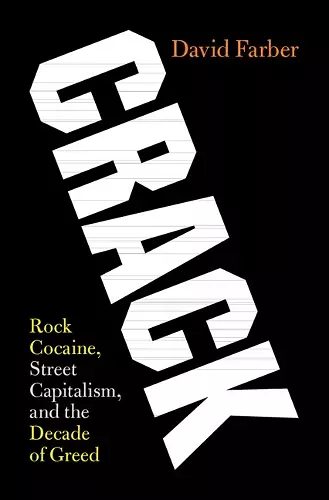Crack
Rock Cocaine, Street Capitalism, and the Decade of Greed
Format:Hardback
Publisher:Cambridge University Press
Published:10th Oct '19
Should be back in stock very soon
This hardback is available in another edition too:
- Paperback£11.99(9781108444064)

The crack cocaine years: from deviant globalization to the 'get money' culture of late twentieth-century America.
Crack tells the story of the young men who bet their lives on the rewards of selling 'rock' cocaine, the people who gave themselves over to the crack pipe, and the merciless authorities who incarcerated legions of African Americans caught in the crack cocaine underworld.A shattering account of the crack cocaine years from award-winning American historian David Farber, Crack tells the story of the young men who bet their lives on the rewards of selling 'rock' cocaine, the people who gave themselves over to the crack pipe, and the often-merciless authorities who incarcerated legions of African Americans caught in the crack cocaine underworld. Based on interviews, archival research, judicial records, underground videos, and prison memoirs, Crack explains why, in a de-industrializing America in which market forces ruled and entrepreneurial risk-taking was celebrated, the crack industry was a lucrative enterprise for the 'Horatio Alger boys' of their place and time. These young, predominately African American entrepreneurs were profit-sharing partners in a deviant, criminal form of economic globalization. Hip Hop artists often celebrated their exploits but overwhelmingly, Americans - across racial lines -did not. Crack takes a hard look at the dark side of late twentieth-century capitalism.
'In 1980s mainstream culture, Ronald Reagan celebrated unfettered capitalist enterprise as the font of national virtue, global supply chains revolutionized the production and distribution of consumer goods, 'greed was good', the tabloids celebrated the flashy self-display of Donald Trump - and the rise of crack cocaine darkly mirrored it all. With great moral passion and flashes of wit, David Farber provocatively demonstrates in this riveting chronicle that while crack, in the awful devastation it wreaked, was a business like no other, it also was a business, like any other. A must-read contribution to the history of our time.' Rick Perlstein, author of The Invisible Bridge: The Fall of Nixon and the Rise of Reagan and Nixonland: The Rise of a President and the Fracturing of America
'David Farber pulls off the historical equivalent of The Wire, but for crack instead of heroin. A master of political and social history, Farber puts the story of violent urban drug markets right where they belong: at the intersection of buccaneering capitalism, dark-slide globalization, and America's enduring divides of race and class.' David Courtwright, author of Dark Paradise and The Age of Addiction
'In the late 1980s, Americans came to believe that illegal drugs were the nation's biggest problem. Crack is an essential read for anyone hoping to understand why. This lively, well-researched history of America's crack cocaine years introduces readers to entrepreneurial dealers, desperate users, and draconian drug policies. Along the way, it illuminates the era's racism, political excesses and media exaggerations, as well as the lasting damage crack and crack dealers wrought in countless neighborhoods of color.' Pam Kelley, author of Money Rock: A Family's Story of Cocaine, Race, and Ambition in the New South
'A great primer for anyone who wants to know more about how crack cocaine got so big in the United States … [A]ccessible, dramatic, and with a clear sense of how the drug blew up and fizzled out. The divide between those most affected by crack, and those who crafted the official response to it is the key factor in explaining why America's war on drugs hasn't worked, and Farber does a good job of bridging the divide.' Tom Feiling, author of Cocaine Nation: How the White Trade Took Over the World and Short Walks from Bogotá: Journeys in the New Colombia
'This thoughtful, well-researched history highlights the futility of viewing drugs as strictly a matter for law enforcement while ignoring their socioeconomic context.' Publishers Weekly
'[A] riveting account of the crack years in America …' Sean O'Hagan, Observer
'And you put down Crack with a feeling that this exploration of a dark part of our history has given you an improved understanding of today, and maybe tomorrow … There are no heroes in David Farber's Crack. There are lasting lessons on how not to handle the next drug epidemic.' Rich Lord, Pittsburgh Post-Gazette
'… a scholarly, yet highly entertaining codex showing the solid economic stability reaped by crack dealers.' Darryl Robertson, Vibe
'Crack will give readers, especially white readers, a new perspective on what went on during the crack years and how it was handled. For younger readers who didn't experience the time period firsthand, it piques interest in something that their parents lived through and have opinions on.' Amanda Salazar, Kings County Politics
'In succinctly presenting a thorough look at the political, economic, and cultural contexts for the crack enterprise, Farber concludes that the players who decided to sell crack were rational actors in a culture of 'entrepreneurial greed.' In the end, we may begin to wonder how the dealer in the hood might be distinguished from the dealer in Big Pharma's executive suite.' Kim Hewitt, The Metropole
'The social history of illicit drugs was lacking a thoroughly researched account on crack use in the 1980s and US historian David Farber has filled the gap with a concise, well-written and informative book that sheds light on a dark episode of contemporary American history, and further illustrates the link between racial and economic inequality and psychoactive substance abuse. The reading is at times absorbing, with some short biographies of crack dealers and users, which provide a fascinating glimpse into the underworld; ... In sum, this excellent tome will likely become the essential text for a contemporary social history of crack cocaine in the United States, and one that will hopefully spur more contributions, focusing on specific places in the country.' Chris Elcock, Canadian Journal of History
ISBN: 9781108425278
Dimensions: 235mm x 158mm x 16mm
Weight: 450g
222 pages